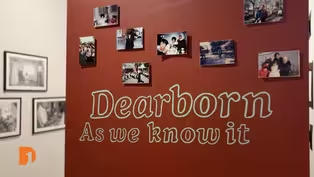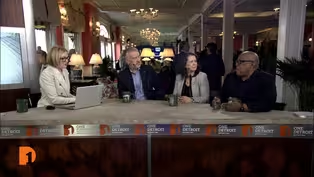
Oral history project preserves the legacy of Detroit women in jazz
Clip: Season 10 Episode 1 | 9m 23sVideo has Closed Captions
Oral historian Veronica Johnson discusses the Detroit Women in Jazz Oral History Project.
Oral historian Veronica Johnson has partnered with the Detroit Sound Conservancy to create the Detroit Women in Jazz Oral History Project. The project digitizes and archives interviews with women in Detroit’s jazz scene. One Detroit contributor Cecelia Sharpe of 90.9 WRCJ talks with Johnson about the women who have shaped Detroit’s jazz scene and how their stories are being preserved.
Problems playing video? | Closed Captioning Feedback
Problems playing video? | Closed Captioning Feedback
One Detroit is a local public television program presented by Detroit PBS

Oral history project preserves the legacy of Detroit women in jazz
Clip: Season 10 Episode 1 | 9m 23sVideo has Closed Captions
Oral historian Veronica Johnson has partnered with the Detroit Sound Conservancy to create the Detroit Women in Jazz Oral History Project. The project digitizes and archives interviews with women in Detroit’s jazz scene. One Detroit contributor Cecelia Sharpe of 90.9 WRCJ talks with Johnson about the women who have shaped Detroit’s jazz scene and how their stories are being preserved.
Problems playing video? | Closed Captioning Feedback
How to Watch One Detroit
One Detroit is available to stream on pbs.org and the free PBS App, available on iPhone, Apple TV, Android TV, Android smartphones, Amazon Fire TV, Amazon Fire Tablet, Roku, Samsung Smart TV, and Vizio.
Providing Support for PBS.org
Learn Moreabout PBS online sponsorship(bright music) ♪ Forever exciting melodies - [Narrator] Jazz in Detroit is more than music.
It's a living archive of resilience, rhythm, and roots.
For generations, the city has been a magnet for jazz musicians.
Now, Veronica Johnson is documenting stories of women who shaped Detroit's jazz scene and beyond, voices often left out of the spotlight.
She's interviewing the musicians and sharing their stories.
- What sparked your interest in jazz?
- Well, actually, my interest in jazz goes back to college.
That just became like, just really, I guess, enamored with the music itself.
The history of it, you know, the culture, you know, just how important this music is to the foundation of Black American music.
- What inspired you to take a closer look at the women in jazz and to collect their oral histories?
- I started doing all this research and then I realized like, "Wow, who's covering the current female Detroit musicians that are all here kinda carrying on this lineage?"
So that's kinda what really inspired me to wanna dig deeper and tell their stories.
- [Narrator] Those stories are part of the growing oral history collection in Detroit Sound Conservancy's digital archives.
- [Pamela] It was at Cuyahoga Community College where I really started getting into jazz and playing jazz because they had a program there.
But it wasn't until I moved to Detroit where I started really establishing myself.
- [Narrator] So far, dozens of jazz musicians have participated in the project.
- I basically interview everybody from Straight Ahead, the great female jazz group from Detroit.
Did great drummer, Gayelynn McKinney, Alina Morr, piano player.
I've interviewed a lot of vocalists like Naima Shamborguer or Ursula Walker, Kate Patterson.
Taslimah Bey, great ragtime pianist.
So, that's just a few, but there's plenty of people I've interviewed so far.
- [Marion] So my father would make sure that I had a chance to hear music.
He took me out to hear the Thad Jones, Mel Lewis Big Band.
That was fantastic.
We went to the Light Guard Armory on Eight Mile Road and heard them.
He was really very, very good about making sure I had a chance hear musicians when they came into town.
And then, little by little, as I started to do a little bit more playing of, you know, Wendell and Marcus would actually, you know, hire me for gigs when I was really quite young.
And so those were my opportunities to really hone my craft and really fall in love with the music in a really big way.
- You partnered with the Detroit Sound Conservancy on this oral history project.
How did the collaboration come together?
- So, I've always been connected to Detroit Sound Conservancy in some form of fashion.
So, when I started my world history project, like, several years ago, I did start off kind of going with Detroit Sound Conservancy.
So now, we're working to, like I said, archive and digitize these oral histories for the world to see.
- [Narrator] The public will be able to listen to them at detroitsound.org.
- [Veronica] What made you want to kinda like, you know, stay in Detroit and kind of build roots as a musician versus, like, going out?
- [Taslimah] I think it was the support that I got from the musicians in Detroit.
The way that they surrounded me.
Like, especially like when I had my son, they surrounded me, supported me, surrounded me with love.
And when I had hard times, they were right there.
They weren't, like, snippy and gossiping and judging and going on with that.
They were just like, "We love you, we support you.
How can we help?"
- Mm-hmm.
- And I was just amazed at that.
- Right.
- [Narrator] Partnering with Johnson on the oral histories is just one way the Detroit Sound Conservancy is helping preserve music history.
Michelle Mama Jahra McKinney, Director of Collections explains, - Well, we do it especially through place keeping, so an example would be us rehabilitating The Blue Bird Inn.
We do it through actual archiving and preserving, which we are taking in the collections of musicians and people who create around the music, and we make them accessible and digitize them or whatever we have to do so that people from years later can come and see, "Wow, this is great!"
"This happened in Detroit?"
"This person did that?"
And also, we create educational resources and collaborations.
- Oh.
- So that's especially gonna show up when we get into The Blue Bird Inn.
- Tell us a little bit about The Blue Bird Inn.
- Well, The Blue Bird Inn is an iconic, historic jazz club and it's just a little neighborhood bar, and that place became a haven.
Because at that time, it was a lot of segregation in the city of Detroit and there were places where Black folks could go and Black folks could not go.
And it was a place where you could have Sunday brunch, and you could see your neighbors and you could feel safe and you could be your Black self.
(Michelle laughs) - Unapologetically.
- Unapologetic, yes.
- Without fear.
- Without fear.
- [Narrator] For generations, Detroit has drawn artists from all over, some just passing through, but many staying for good.
The city is also home to the world's largest free jazz festival, the Detroit Jazz Festival, drawing hundreds of thousands of attendees each year.
♪ To you - [Pamela] I like the jazz scene in Detroit.
It's a Detroit thing, I think, where people just uplift each other and whatever you need, you know, they'll show you the way ♪ It's for you to get up ♪ And show the world ♪ What we have in store - How did women shape the jazz culture in Detroit?
- They had a great impact on it.
And, you know, that kinda stuff that you can hear that's toe tapping and you can sing along with it and remember the melody and be humming it to yourself, that was made more possible by women singing in jazz.
To me, the storytelling, ♪ All of me ♪ Why not take all of me?
♪ Can't you see I'm no good without you?
♪ - When we think about that Detroit sound, what is it about the sound of Detroit that makes it so unique?
- It still comes out of community.
Actually, not even community, familyhood.
That's what, to me, is what makes the communication and the mentorship and the passing things down that Detroit musicians do, is it has extended worldwide.
And so, not only is it a sound, it's a feeling.
It's a feeling of connectedness in a familyhood.
And somehow, that's embodied in the music.
(lively jazz music) That Detroit sound that was in the really basic music that was there, created by the jazz musicians, the improvisation, the African rhythms that are embedded in it.
All of that context is still going on, and created that Detroit sound between the love that is in that music.
It's pure love.
- What made Detroit a destination for jazz?
Or was jazz the destination for the people?
- Detroit is a destination for musicians.
It always has been because of the music that they brought as they migrated north.
But at the same time, it's all also about the connections, like, of a Marcus Belgrave.
He was just coming through Detroit with Ray Charles and he said, "Ooh, I love this city!"
Yeah, and people taking him under their wing and talking to him.
And he left Detroit and he came back, and he said, "I can't leave this place."
He didn't wanna leave.
- What is it that you hope that people walk away with after hearing some of these stories?
- Well, I just really want to, you know, people to realize how, like, you know, their work ethic, their resiliency of these women, you know.
Like, again, a lot of the women I've interviewed, some in their 70s, 80s, still performing.
So it just goes to show how much they love music and I just want people to realize, like, that obviously, women have as much of an influence and impact on Detroit jazz as the male counterparts.
So I just want people to see the breadth and depth of these women and what they've done and what they've accomplished throughout their years.
(energetic jazz music) (audience applauds and cheers)
Arab American National Museum’s David Serio details the history of Arab immigration in Michigan
Video has Closed Captions
Clip: S10 Ep1 | 7m 1s | One Detroit’s Sarah Zientarski explores the history of Arab immigration in Michigan. (7m 1s)
Destination Detroit initiative tells the region's story through people who shaped it
Video has Closed Captions
Clip: S10 Ep1 | 6m 8s | A conversation about Detroit PBS’ Destination Detroit initiative (6m 8s)
Providing Support for PBS.org
Learn Moreabout PBS online sponsorship
- News and Public Affairs

Top journalists deliver compelling original analysis of the hour's headlines.

- News and Public Affairs

FRONTLINE is investigative journalism that questions, explains and changes our world.












Support for PBS provided by:
One Detroit is a local public television program presented by Detroit PBS

